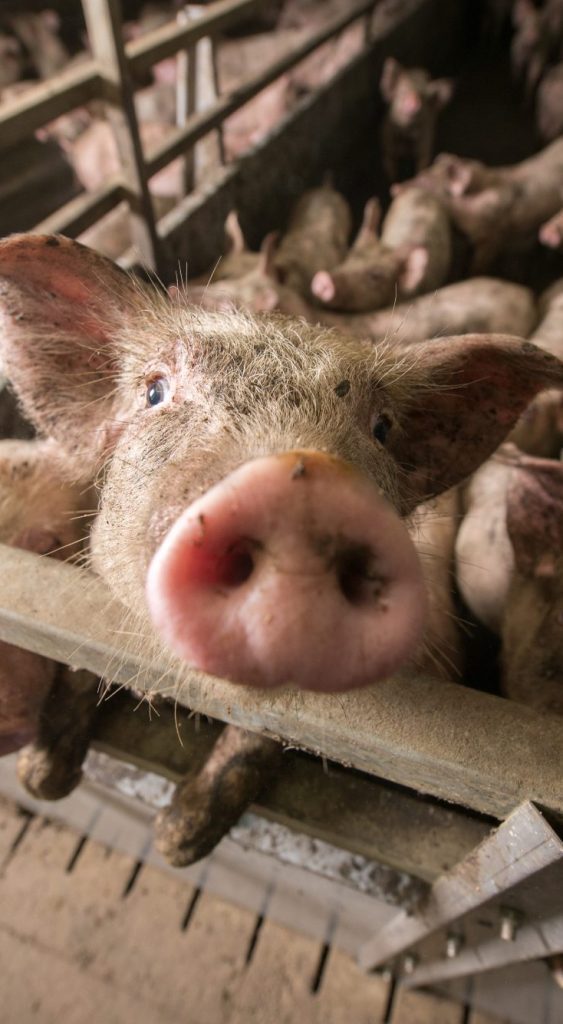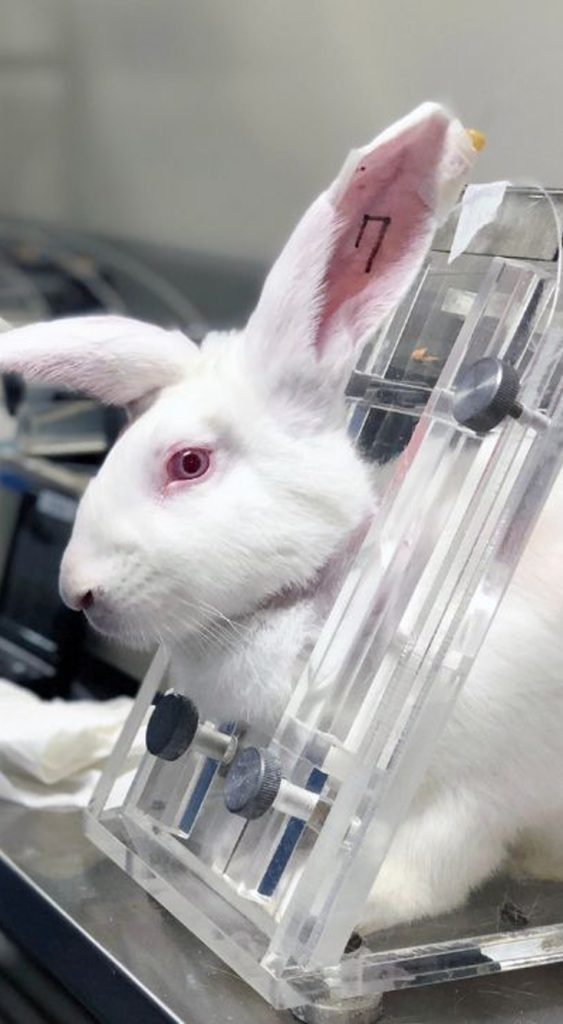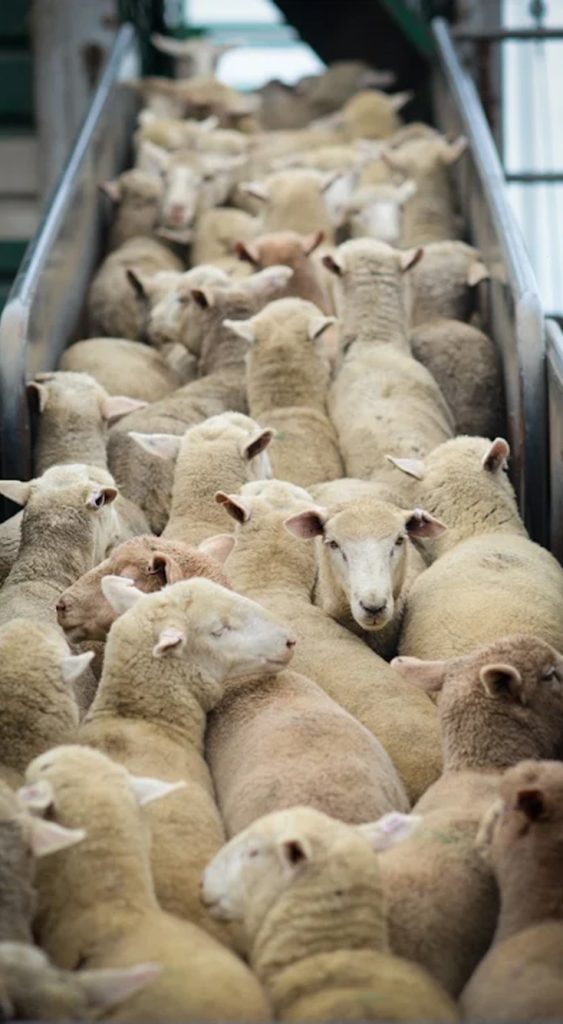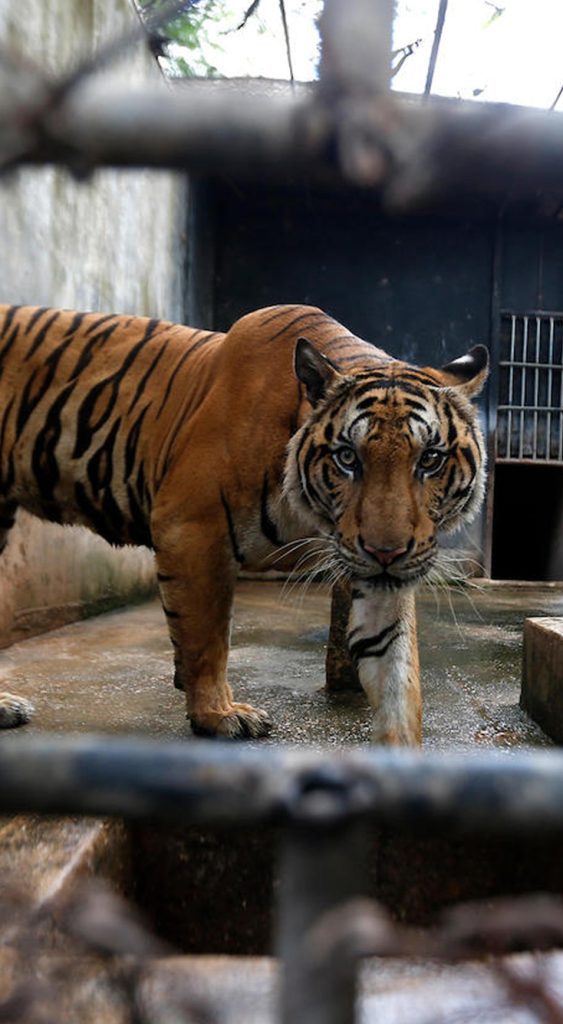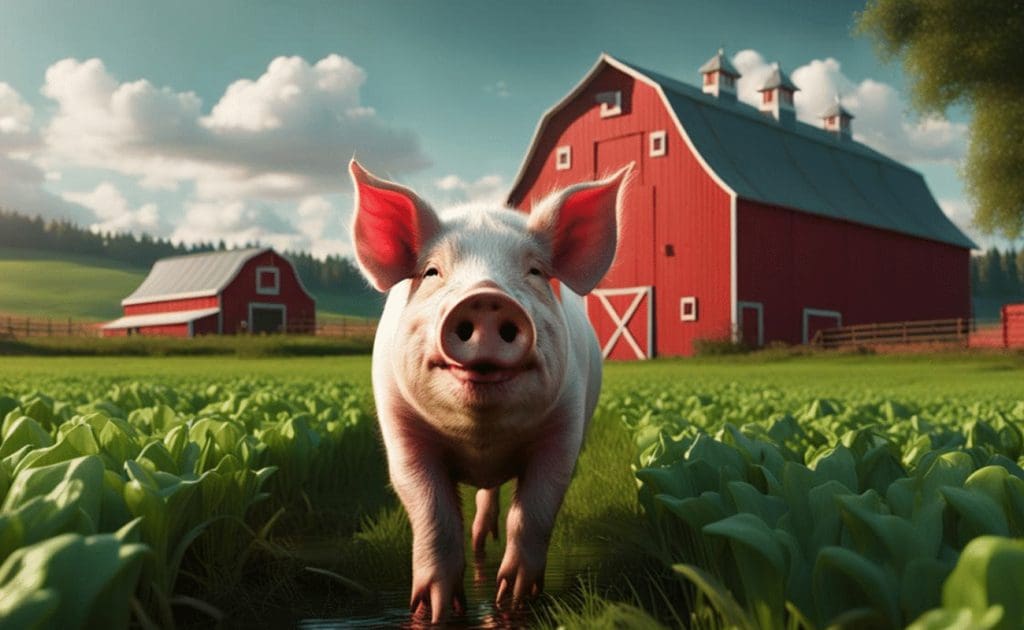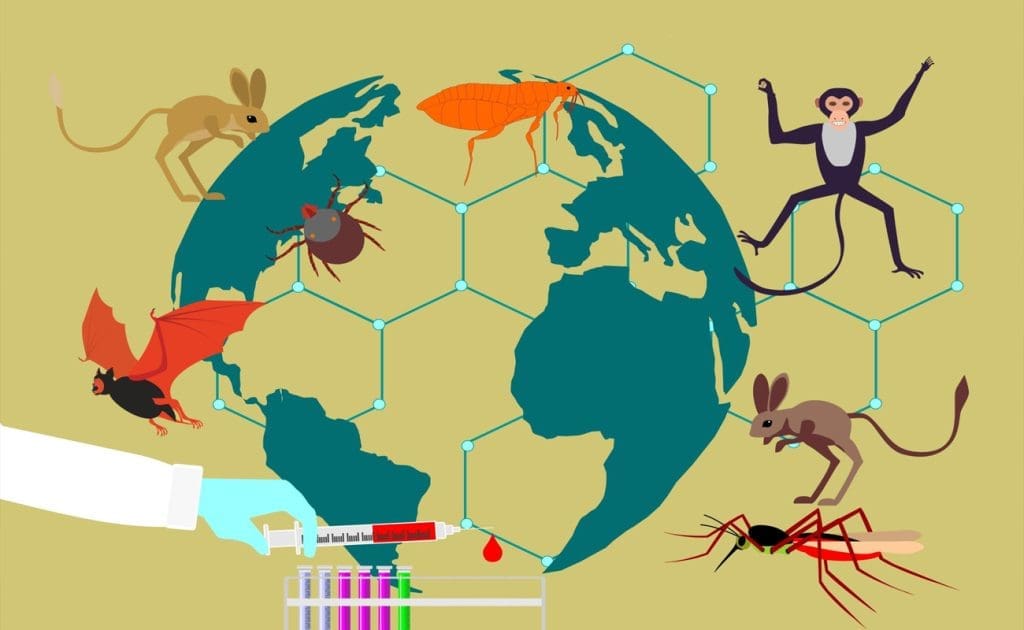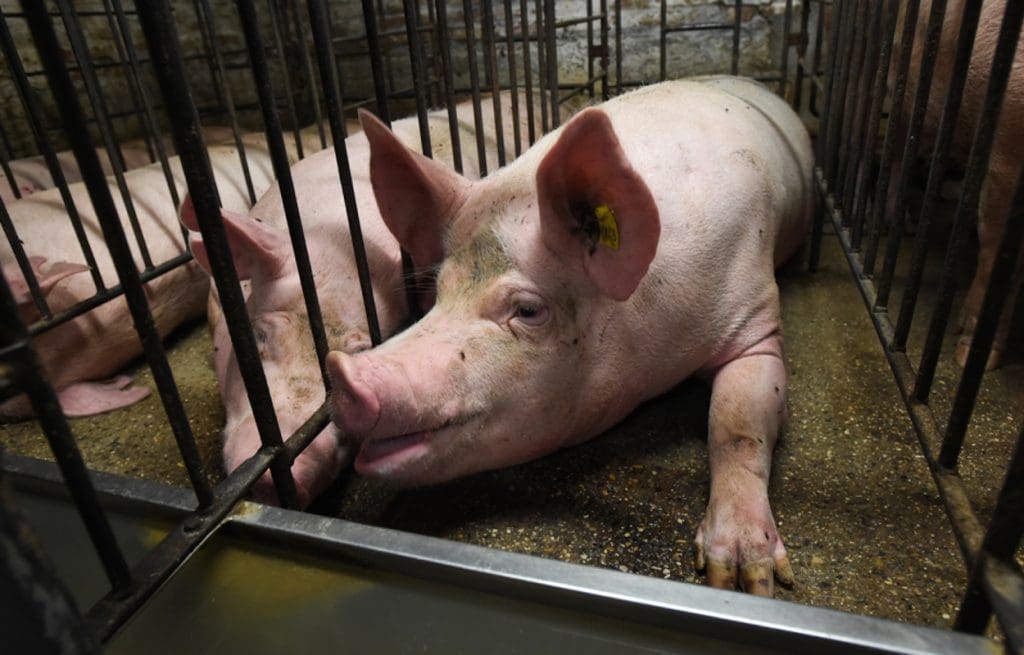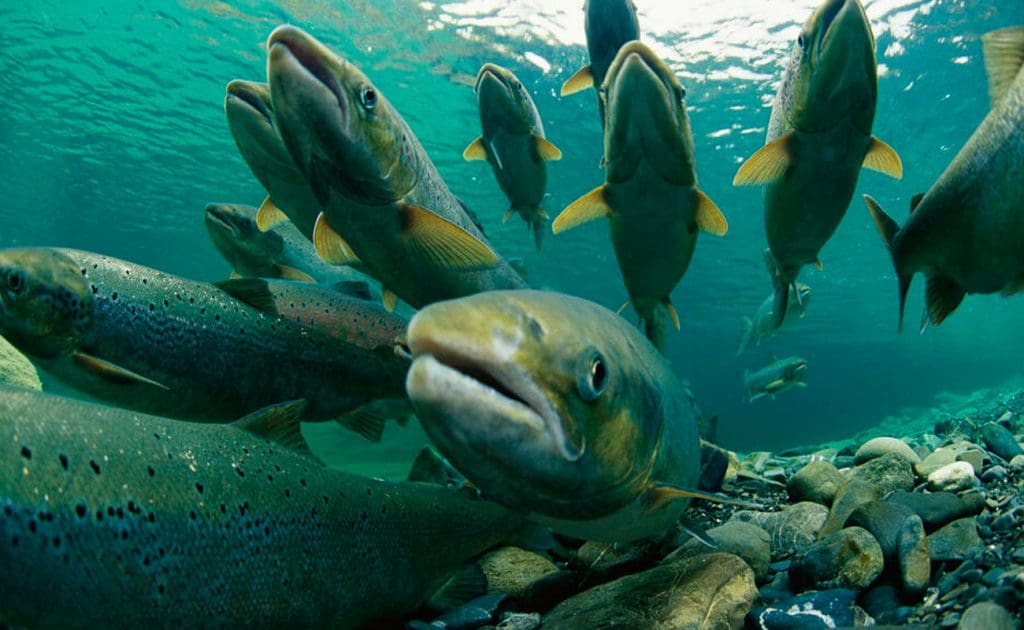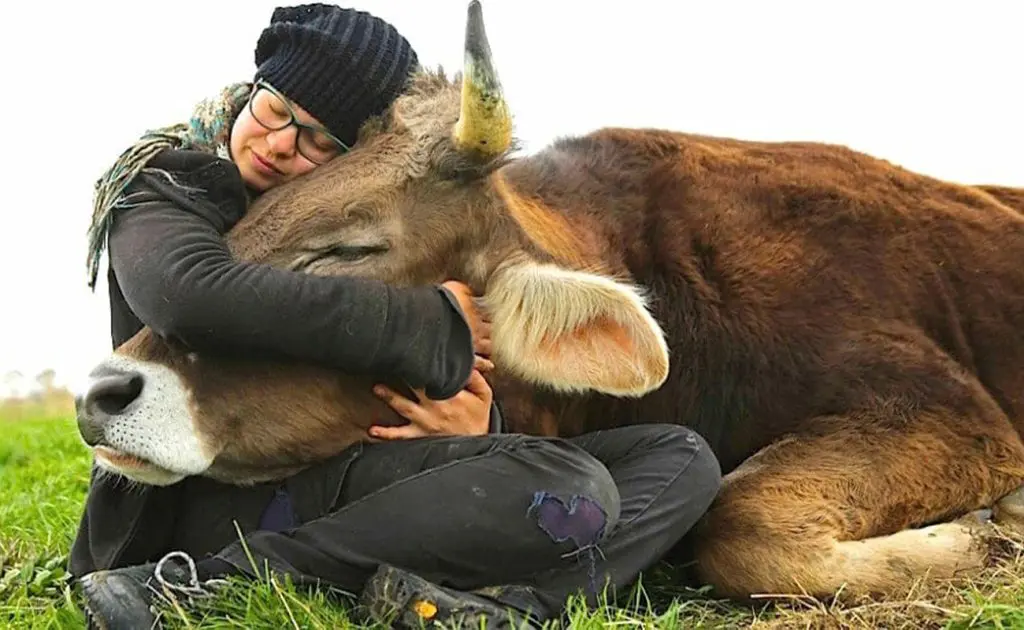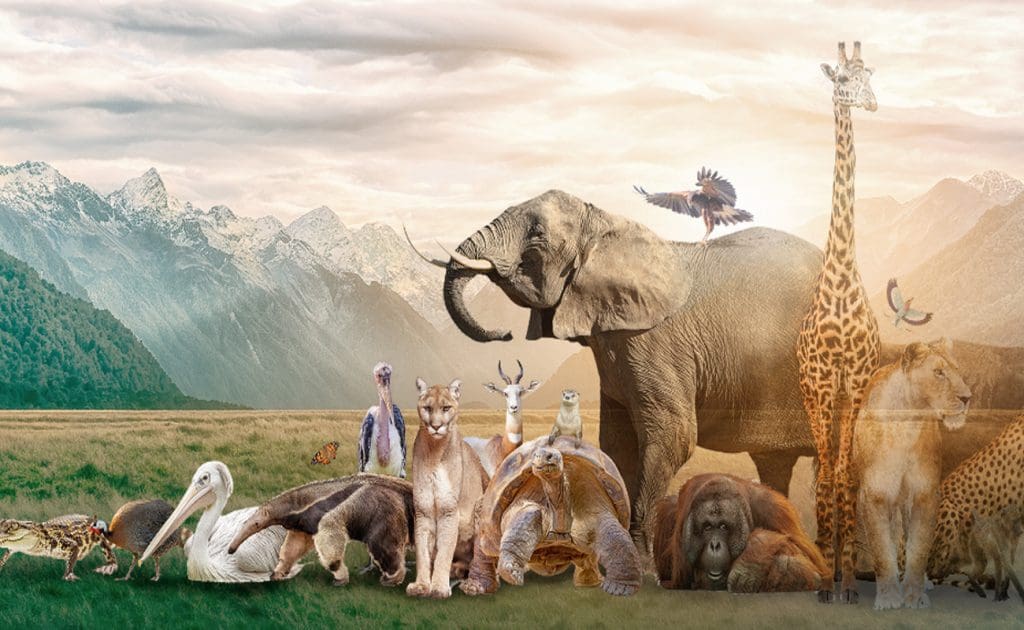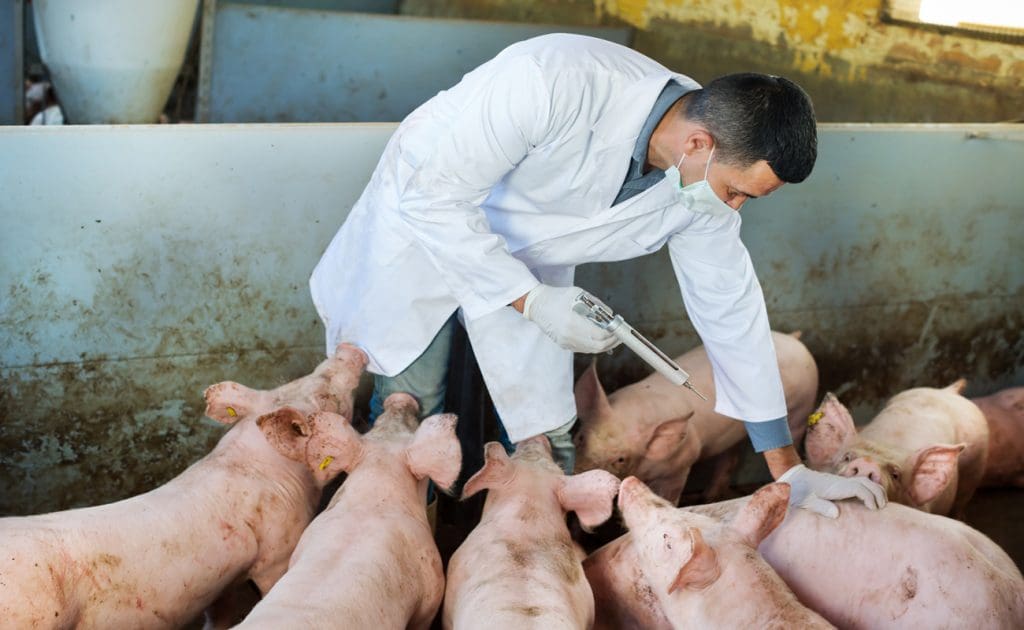
15 000 литр
барои истеҳсоли як килограмм гӯшти гов об лозим аст - мисоли равшани он, ки чӣ тавр хоҷагии ҳайвонот сеяки оби тозаи ҷаҳонро истеъмол мекунад. [1]

80%
аз ҷангалҳои Амазонка вобаста ба чорводорӣ буда, ки гунаҳгори рақами як дар паси нобудшавии ҷангали калони ҷаҳон аст. [2]
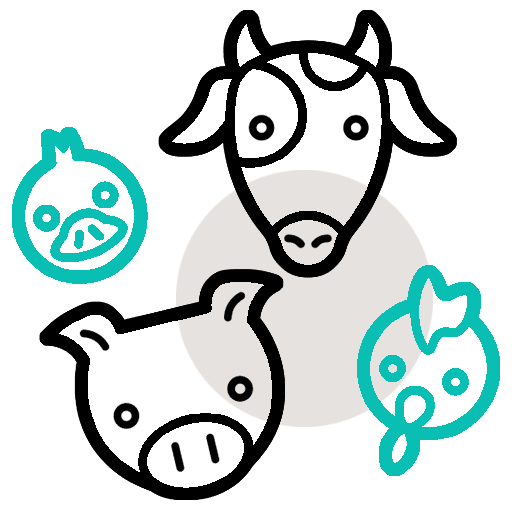
77%
аз заминҳои ҷаҳонии кишоварзӣ барои чорво ва хӯроки чорво истифода мешаванд - ва ҳанӯз танҳо 18% калорияҳои ҷаҳон ва 37% сафедаи онро таъмин мекунад. [3]

ГПГ
Кишоварзии ҳайвоноти саноатӣ газҳои гулхонаиӣ бештар аз тамоми бахши нақлиёти ҷ transporti ҷаҳонӣ истеҳсол мекунад. [4]

92 миллиард" billions
аз ҳайвоноти хушки замин ҳар сол барои ғизо кушта мешаванд — ва 99% -и онҳо дар фермаҳои саноатӣ зиндагӣ мекунанд. [5]

400+ намуд
аз газҳои заҳролуд ва 300+ миллион тонна пору аз ҷониби фермаҳои заводӣ истеҳсол карда мешаванд, ки ба ҳаво ва оби мо заҳролуд мекунанд. [6]

1 048 миллион тонна
аз ғалладонаҳо ба паррандагон солона ҳазорон тонна ғизо дода мешавад, ки барои аз байн бурдани гуруснагии ҷаҳонӣ якчанд маротиба кифоя аст. [7]

37%
аз партобҳои метан аз хоҷагии ҳайвонот сарчашма мегиранд - гази гулхонаӣ 80 маротиба аз CO₂ зиёдтар аст, ки боиси таназзули иқлим мегардад. [8]

80%
аз антибиотикҳо дар саросари ҷаҳон дар ҳайвоноти фермавӣ истифода мешаванд, ки боиси муқовимати антибиотикҳо мегардад. [9]

1 то 2.8 триллион
ҳазорҳо ҳайвоноти обӣ ҳар сол аз моҳидорӣ ва обчакорӣ кушта мешаванд - аксарияти онҳо ҳатто дар омори кишоварзии ҳайвонот ҳисоб намешаванд. [10]

60%
аз талафоти гуногунии биологии ҷаҳонӣ бо истеҳсоли хӯрок алоқаманд аст - бо кишоварзии ҳайвонот будан рондари асосӣ. [11]

75%
аз заминҳои кишоварзии ҷаҳонӣ озод карда мешавад, агар ҷаҳон парҳезҳои растанӣ қабул кунад - кушодани майдони андозаи Иёлоти Муттаҳида, Чин ва Иттиҳоди Аврупо. [12]

Мо чӣ мекунем
Беҳтарин коре, ки мо карда метавонем, ин тағир додани тарзи хӯрокхӯрии мост. Парҳези растанӣ интихоби бештар ҳамдардӣ нисбат ба сайёра ва намудҳои гуногунест, ки мо бо онҳо зиндагӣ мекунем.

n
Кишоварзии ҳайвонот сабаби асосии талафоти гуногунии биологӣ ва нобудшавии намудҳо дар саросари ҷаҳон аст, ки ба экосистемаҳои мо таҳдиди ҷиддӣ эҷод мекунад.
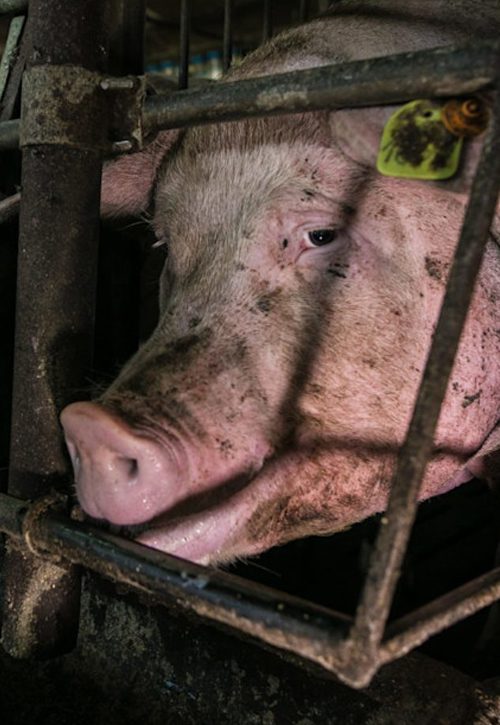
Ба охир расонидани азобҳои онҳо
Деҳқончигии заводӣ ба талаби истеъмолкунандагон барои гӯшт ва маҳсулоти аз ҳайвонот гирифташуда такя мекунад. Ҳар як хӯроки растанӣ ба озод кардани ҳайвонот аз системаҳои бешаҳрӣ ва истифодабарӣ мусоидат мекунад.

Дар растанӣ рушд кунед
Хӯрокҳои растанӣ на танҳо хушбӯю болаззат, балки инчунин аз витаминҳо ва минералҳои муҳим бой мебошанд, ки энергияро афзоиш медиҳанд ва некӯаҳволии умумиро беҳтар мекунанд. Ҷалби парҳези растанӣ стратегияи муассир барои пешгирии бемориҳои музмин ва дастгирии саломатии дарозмуддат мебошад.
Зулми хоҷагиҳои фабрикавӣ:
Дар он ҷо ҳайвонот хомӯшона азоб мекашанд, Мо овози онҳоро садо медиҳем.
Азияти ҳайвонот дар кишоварзӣ
Дар ҳар ҷое, ки ба ҳайвонот зарар расонида мешавад ё овозҳояшон баланд нашудааст, мо барои муқовимат бо зулм ва ҷонибдории ҳамдардӣ қадам мезанем. Мо барои ошкор кардани беадолатӣ, тағйироти пойдор ва ҳимояи ҳайвонот дар ҳар ҷое, ки некӯаҳволии онҳо таҳдид карда мешавад, саъй мекунанд.
n92 миллиард
Ҳақиқат дар паси саноати хӯроквории мо
Ҳақиқат дар паси саноати хӯроквории мо як воқеияти пинҳонӣ аз беҳудагии парвариши фабрикӣро ошкор мекунад, ки дар онҳо миллиардҳо ҳайвонот ҳар сол азобҳои зиёдеро таҳаммул мекунанд. Ғайр аз таъсир ба некуаҳволии ҳайвонот, хоҷагии саноатӣ инчунин зарари ҷиддии муҳити зистро ба бор меорад, аз тағйирёбии иқлим то талафоти гуногунии биологӣ. Дар айни замон, система ба хатарҳои афзояндаи саломатӣ, аз ҷумла фарбеҳӣ, диабети қанд ва бемориҳои дил мусоидат мекунад. Интихоби парҳези растанӣ ва қабули усулҳои зиндагии устувор як роҳи ҳалли пурқувват пешниҳод мекунад - азобҳои ҳайвонотро коҳиш медиҳад, сайёраро ҳифз мекунад ва саломатии инсонро беҳтар мекунад.
САНОАТИ ГŌШТ
ҲАЙВОНОТ БАРОИ ГӮШТ КУШТА ШУДААНД
Ҳайвоноте, ки барои гӯшти худ кушта мешаванд, аз рӯзи таваллудашон ранҷ мекашанд. Саноати гӯшт бо баъзе аз шадидтарин ва беинсофонатарин амалҳо алоқаманд аст.

Говҳо
Дар зодгоҳи азоб, говҳо тарс, ҷудоӣ ва расмиёти бераҳмонаро аз қабили хориҷ кардани шох ва кастация - пеш аз оғози куштор таҳаммул мекунанд.
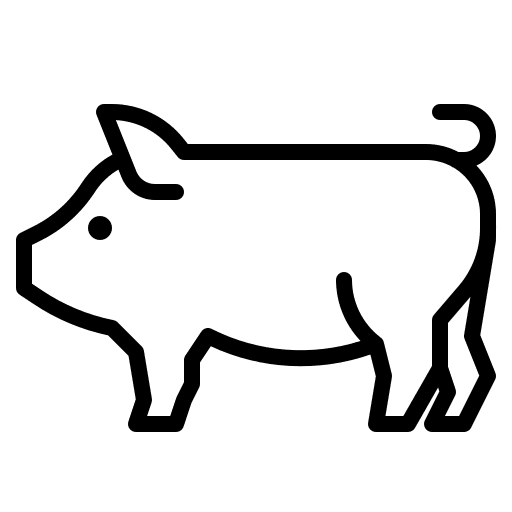
Хукҳо
Хукҳо, ки аз сагҳо донотаранд, умри худро дар фермаҳои танг ва бечароғ мегузаронанд. Хукҳои мода бештар азоб мекашанд - пайваста ҳомила ва ба қафасҳои чунон танг маҳдуд карда мешаванд, ки ҳатто барои тасаллӣ додани ҷавонашон гардонида наметавонанд.

Мурғҳо
Мурғҳо бадтарин шароити хоҷагии фабрикиро таҳаммул мекунанд. Онҳо ҳазорҳо нафар дар ҷойҳои ифлос ҷамъ карда шуда, барои зуд калон шудан парвариш дода мешаванд, ки боиси деформатсияҳои дардовар ва марги бармаҳал мегардад. Аксари онҳо дар синни ҳафт ҳафтагӣ кушта мешаванд.

Бузҳо
Барраҳо азиятҳои дардноки ҷисмониро таҳаммул мекунанд ва танҳо чанд рӯз пас аз таваллуд аз модарашон ҷудо мешаванд - ҳама барои гӯшт. Азоби онҳо хеле барвақт оғоз мешавад ва хеле барвақт ба поён мерасад.

Харгӯшҳо
Харгӯшҳо куштори бераҳмонаро бидуни ҳимояти қонунӣ таҳаммул мекунанд - бисёре аз онҳо латукӯб мешаванд, бадрафторӣ мекунанд ва ҳангоми ҳанӯз шуур доштанашон гулӯяшон бурида мешавад. Азобҳои хомӯши онҳо аксар вақт ноаён мемонад.

Куркаҳо
Ҳар сол, миллионҳо куркаҳо бо марги бешаҳрӣ рӯ ба рӯ мешаванд, бисёре аз онҳо аз стресс ҳангоми интиқол ё ҳатто дар ҷойҳои ҷасад ҷӯшида мешаванд. Сарфи назар аз зеҳни онҳо ва робитаҳои қавӣ оила, онҳо ором ва ба миқдори зиёд ранҷ мекашанд.
ҒАЙР АЗ ЗУЛМ
Саноати гӯшт ба сайёра ва саломатии мо зарар мерасонад.
Таъсири экологии гӯшт
Парвариши ҳайвонот барои ғизо миқдори зиёди замин, об, энергияро истифода мебарад ва боиси зарари калон ба муҳити зист мегардад. FAO-и СММ мегӯяд, коҳиш додани истеъмоли маҳсулоти ҳайвонот барои мубориза бо тағирёбии иқлим муҳим аст, зеро парвариши ҳайвонот қариб 15% аз партови газҳои гулхонаии ҷаҳониро ташкил медиҳад. Хоҷагиҳои фабрикӣ инчунин захираҳои обро барои хӯрок, тозакунӣ ва нӯшокӣ исроф мекунанд ва дар ҳоле ки дар ИМА зиёда аз 35 000 мил дарёҳо ва обҳои дохилиро ифлос мекунанд.
Хатарҳои саломатӣ
Истеъмоли маҳсулоти ҳайвонот хатари мушкилоти ҷиддии саломатиро афзоиш медиҳад. СМТ гӯшти коркардшударо ҳамчун кансероген тасниф мекунад, ки хатари саратони рӯда ва рӯдаи рост 18% афзоиш медиҳад. Маҳсулоти ҳайвонот аз чарбҳои серғизо бой буда, бо бемориҳои дил, сакта, диабети қанд ва саратон алоқаманданд - сабабҳои асосии марг дар ИМА. Таҳқиқот нишон медиҳанд, ки гиёҳхорон дарозтар умр мебинанд; як таҳқиқот нишон дод, ки онҳо дар тӯли шаш сол нисбат ба хӯрандагони гӯшт 12% камтар мемиранд.
Саноати шир
АСРОРИ ТОРИКИИ ШИР
Дар паси ҳар як литр шир давраи азоб ҷойгир аст - мода говҳо пайваста ҳомила мешаванд, танҳо барои он ки гӯсолаҳояшонро бигиранд, то ширашон барои одамон истифода бурда шавад.
Оилаҳои пароканда
Дар фермаҳои ширӣ, модаҳо барои гӯсолаҳояшон гиря мекунанд, вақте ки онҳо дур бурда мешаванд — то шире, ки барои онҳо пешбинӣ шудааст, барои мо шишабандӣ карда шавад.
Танҳо якҷоя
Гӯсолаҳо, ки аз модарони худ ҷудо шудаанд, ҳаёти аввали худро дар танҳоии сард мегузаронанд. Модарони онҳо дар оғилҳои танг банд монда, солҳо азоб мекашанд - танҳо барои истеҳсоли шири барои мо пешбинишуда.
Мутацияҳои дардовар
Аз дарди сӯзондани брендинг то дарди шадиди деҳорни ва дум docking - ин расмиёти зӯроварӣ бидуни анестезия анҷом дода мешаванд, ки говҳоро боқимонда, тарсончак ва шикаста мемонанд.
Ба таври шадид кушта шудааст
Говҳое, ки барои шир парвариш карда мешаванд, ба охири бераҳмона дучор мешаванд, хеле ҷавон кушта мешаванд, вақте ки дигар шир намедиҳанд. Бисёре аз онҳо сафарҳои дарднокро таҳаммул мекунанд ва ҳангоми куштор ҳушёр мемонанд, азобҳои онҳо дар пашти деворҳои саноат пинҳон аст.
ҒАЙР АЗ ЗУЛМ
Ширдиҳии бераҳмона ба муҳити зист ва саломатии мо зарар мерасонад.
, "Кризис
Парвариши ширӣ миқдори зиёди метан, оксиди нитроген ва диоксиди карбон - газҳои гулхонаи пурқувват, ки ба атмосфера зарар мерасонанд, бароварда мекунад. Он инчунин бо табдил додани манзараҳои табиӣ ба заминҳои кишоварзӣ боиси нестшавии ҷангалҳо мегардад ва манбаъҳои оби маҳаллиро тавассути коркарди нодурусти пору ва нуриҳои минералӣ ифлос мекунад.
Хатарҳои саломатӣ
Истеъмоли маҳсулоти ширӣ бо хатари баланди мушкилоти ҷиддии саломатӣ, аз ҷумла саратони сина ва простата, аз сабаби сатҳи баланди омили афзоиши инсулин монанд дар шир алоқаманд аст. Ҳангоме ки калсий барои устухонҳои мустаҳкам муҳим аст, шир манбаи ягона ва беҳтарин нест; баргҳои сабз ва нӯшокиҳои растанӣ, ки бо моддаҳои ғизоӣ ғанӣ гардонида шудаанд, алтернативаҳои беҳаёӣ ва солимтар пешниҳод мекунанд.
САНОАТИ ТУХМ
ҲАЁТИ МОРҶАВОНИ ДАР ҚАФОС
Мурғҳо ҳайвоноти иҷтимоӣ ҳастанд, ки аз ҷустуҷӯи ғизо ва ғамхорӣ барои оилаҳои худ лаззат мебаранд, аммо онҳо то ду сол дар қафасҳои хурд маҳдуд шуда, наметавонанд болҳои худро паҳн кунанд ё табиатан рафтор кунанд.
34 соат азоб: Арзиши воқеии тухм
Куштани ҷӯҷаҳои нар
Мурғчаҳои нарина, ки наметавонанд тухм гузоранд ё мисли мурғҳои гӯштӣ рушд кунанд, аз ҷониби саноати тухм беарзиш ҳисобида мешаванд. Дарҳол пас аз баромадан, онҳо аз мурғчаҳои модина ҷудо карда мешаванд ва бераҳмона кушта мешаванд - ё нафасгир мешаванд ё дар мошинҳои саноатӣ зинда майда мешаванд.
Маҳдудияти шадид
Дар ИМА, тақрибан 75%и мурғҳо ба қафасҳои хурди симӣ банд карда шудаанд, ки ҳар кадом камтар аз варақи коғази чопгар доранд. Маҷбур карда шуда, ки бар сари симҳои сахт, ки пойҳояшонро захмӣ мекунанд, бисёр мурғҳо азоб мекашанд ва дар ин қафасҳо мемиранд, баъзан дар байни зиндагон мепӯсанд.
Ҷароҳатҳои бераҳмона
Мурғҳо дар саноати тухм аз фишори шадид аз маҳдудияти шадид азият мекашанд, ки боиси рафтори зараровар ба мисли худзалакунӣ ва каннибализм мегардад. Дар натиҷа, коргарон бидуни дардовар қисман аз нӯгҳои ҳассоси онҳо мебуранд.
ҒАЙР АЗ ЗУЛМ
Саноати тухм ҳам ба саломатии мо ва ҳам ба муҳити зист зарар мерасонад.
[4] https://www.fao.org/4/a0701e/a0701e00.htm
Истеҳсоли тухм ба муҳити зист зарари калон мерасонад. Ҳар як тухми истеъмолшуда миқдори зиёди газҳои гулхонаӣ, аз ҷумла аммиак ва диоксиди карбонро ба вуҷуд меорад. Илова бар ин, миқдори зиёди пестисидҳое, ки дар хоҷагиҳои тухмпарварӣ истифода мешаванд, обҳои маҳаллӣ ва ҳаво, боиси харобии васеи муҳити зист мешаванд.
Хатарҳои саломатӣ
Тухмҳо метавонанд бактерияҳои зараровари Salmonella дошта бошанд, ҳатто вақте ки онҳо муқаррарӣ ба назар мерасанд, боиси нишонаҳои беморӣ ба монанди дарунравӣ, табларза, дарди шикам, дарди сар, дилбеҳузурӣ ва қайкунӣ мешаванд. Тухмҳои фабрикӣ аксар вақт аз мурғҳое, ки дар шароити бад нигоҳ дошта мешаванд, меоянд ва метавонанд антибиотикҳо ва гормонҳо дошта бошанд, ки хатарҳои саломатӣ доранд. Илова бар ин, миқдори зиёди холестирин дар тухм метавонад ба мушкилоти дил ва рагҳои хунгузар дар баъзе одамон мусоидат кунад.
Саноати моҳигирӣ
Саноати моҳидории марговар
Моҳӣ дард ҳис мекунад ва сазовори муҳофизат аст, аммо дар парвариш ё моҳидорӣ ҳуқуқи қонунӣ надорад. Сарфи назар аз табиати иҷтимоӣ ва қобилияти эҳсоси дард, онҳо ҳамчун молҳои оддӣ муносибат мекунанд.
Моҳии хоҷагии истеҳсолӣ
Аксари моҳии имрӯз истеъмолшаванда дар шароити серодам дар хушкӣ ё дар обҳои баҳрӣ парвариш карда мешаванд, ки тамоми умрашон дар обҳои ифлос бо сатҳи баланди аммиак ва нитратҳо маҳдуданд. Ин шароитҳои сахт боиси инвазияҳои зуд-зуд паразитҳо мешаванд, ки ба ҷабҳаҳо, узвҳо ва хунашон ҳамла мекунанд, инчунин сироятҳои васеъшавии бактериявӣ.
Моҳидорӣ саноатӣ
Моҳидӯрии тиҷоратӣ боиси азоби шадиди ҳайвонот мегардад, ки ҳар сол тақрибан як триллион моҳӣ дар саросари ҷаҳон кушта мешаванд. Киштиҳои азим хатҳои дарозро истифода мебаранд - то 50 мил бо садҳо ҳазор қилоби домдор - ва турҳои гулӯ, ки метавонанд аз 300 фут то ҳафт мил тамдид кунанд. Моҳӣ кӯр-кӯрона ба ин турҳо меафтанд, аксар вақт нафасгир мешаванд ё то ба ҳалокат хунравӣ мекунанд.
Қатли бераҳмона
Беҳ муҳофизати қонунӣ, моҳӣ дар қаторхонаҳои ИМА азобҳои даҳшатовар мекашанд. Аз об ҷудо карда, онҳо нотавон нафас мегиранд, вақте ки ҷабҳаҳояшон фурӯ мепашанд, оҳиста дар азоб нафас намегиранд. Моҳии калонтар - тунец, шамшермоҳӣ - ба таври шадид зарба мехӯранд, аксар вақт захмӣ мешаванд, вале ҳанӯз ҳушёр, маҷбур мешаванд, ки пеш аз марг зарбаҳои такрорӣ тоб биёранд. Ин зулми беамон дар зери сатҳ пинҳон аст.
ҒАЙР АЗ ЗУЛМ
Саноати моҳидорӣ сайёраамонро хароб мекунад ва ба саломатии мо зарар мерасонад.
[12] https://ourworldindata.org/land-use-diets
Моҳидорӣ ва моҳипарварии саноатӣ ҳарду ба муҳити зист зарар мерасонанд. Корхонаҳои моҳипарварӣ обро бо сатҳи заҳрноки аммиак, нитратҳо ва паразитҳо ифлос мекунанд, ки боиси харобиҳои васеъ мегардад. Киштиҳои калони моҳидорӣ қаъри уқёнусро харошида, манзилҳоро хароб мекунанд ва то 40% доми худро ҳамчун доми иловагӣ партофта, таъсири экологӣ бадтар мешавад.
Хатарҳои саломатӣ
Истеъмоли моҳӣ ва маҳсулоти дарёӣ хатарҳои саломатӣ дорад. Бисёр намудҳо ба монанди туна, шамшермоҳӣ, акула ва скумбрия сатҳи баланди симоб доранд, ки метавонанд ба системаҳои асабии инкишофёбандаи ҳомила ва кӯдакони хурдсол зарар расонанд. Моҳӣ инчунин метавонад бо моддаҳои заҳролуд ба мисли диоксинҳо ва ПХБҳо, ки бо саратон ва мушкилоти репродуктивӣ алоқаманданд, олуда шавад. Илова бар ин, таҳқиқот нишон медиҳанд, ки истеъмолкунандагони моҳӣ метавонанд ҳар сол ҳазорҳо зарраҳои хурди пластикиро фурӯ баранд, ки метавонад боиси илтиҳоб ва осеби мушакҳо дар тӯли вақт гардад.
200 ҳайвон.
Ин аст, ки чанд умр як нафар метавонад ҳар сол бо рафтанаш ба гиёҳхорӣ эмин нигоҳ дорад.
Дар айни замон, агар ғалла барои парвариши чорво истифода шавад, ба ҷои он ки барои одамон ғизо дода шавад, он метавонад то 3,5 миллиард одамро дар як сол бо ғизо таъмин кунад.
Қадами муҳим дар ҳалли гуруснагӣ дар ҷаҳон.



Маҳдудияти бераҳмона
Воқеияти парвариши фабрикӣ
Тақрибан 99% ҳайвоноти парваришӣ тамоми умрашонро дар дохили хоҷагиҳои бузурги саноатӣ мегузаронанд. Дар ин иншоотҳо, ҳазорҳо дар қафасҳои симӣ, қуттиҳои филизӣ ё дигар қафасҳои маҳдудкунанда дар дохили анборҳои ифлос ва бе равзана ҷойгир карда мешаванд. Онҳо аз рафторҳои асосии табиӣ - ба воя расонидани ҷавонон, ғизо дар хок, сохтани лонаҳо ё ҳатто эҳсоси нур ва ҳавои тоза - то рӯзе, ки ба қаторхонаҳо бурда мешаванд, маҳрум карда мешаванд.
Саноати парвариши фабрикӣ барои ба ҳадди аксар расонидани фоида ба ҳисоби ҳайвонот сохта шудааст. Бо вуҷуди беҳаёӣ, система идома дорад, зеро он ҳамчун фоидаовартар дида мешавад ва дар паси худ изи харобиовар аз азоби ҳайвонотро, ки аз назари ҷамъият пинҳон аст, мегузорад.
Ҳайвонот дар фермаҳои фабрикӣ аз тарсу ваҳшат ва азоб мекашанд:
Маҳдудияти фазо
Ҳайвонот аксар вақт чунон танг мебошанд, ки наметавонанд гардиш кунанд ё дурӯз кунанд. Мурғҳо дар қафасҳои хурд, мурғҳо ва хукҳо дар анборҳои пурзӯр ва говҳо дар лойҳои ифлос зиндагӣ мекунанд.
Истифодаи антибиотикҳо
Антибиотикҳо афзоишро тезонанд ва ҳайвонотро дар шароити ғайрисанитарӣ зинда нигоҳ медоранд, ки метавонад бактерияҳои антибиотик тобовар, барои одамон зарароварро тарвиҷ кунад.
Манипулясияи генетикӣ
Бисёр ҳайвонот тағир дода мешаванд, то калонтар ё истеҳсоли шир ё тухм зиёдтар шаванд. Баъзе мурғҳо барои пойҳояшон хеле вазнин мешаванд ва онҳоро гурусна мемонанд ё наметавонанд ба ғизо ва об дастрасӣ пайдо кунанд.
Омода барои тағйир додани?
Шумо инҷо ҳастед, зеро шумо ғамхорӣ мекунед - дар бораи одамон, ҳайвонот ва сайёра.

Чаро ҳаёти растанӣ-асосӣ интихоб кунед?
Сабабҳои пурқувват дар паси рафтанатон ба сӯи парҳези растанӣ - аз саломатии беҳтар то сайёра бо раҳмтарро омӯзед. Бифаҳмед, ки интихоби ғизои шумо то чӣ андоза муҳим аст.

Дастури шумо барои оғози тарзи ҳаёти растанӣ
Кадамҳои содда, маслиҳатҳои оқилона ва захираҳои муфидро барои оғози сафари парҳеши растании худ бо боварӣ ва осонӣ кашф кунед.
Зиндагии устувор барои ояндаи сабз.
Растаниҳо интихоб кунед, сайёраро муҳофизат кунед ва ояндаи меҳрубонтарро қабул кунед - роҳи зиндагӣ, ки саломатии шуморо нигоҳ медорад, ҳама ҳаётҳоро эҳтиром мекунад ва устувории наслҳои ояндаро таъмин мекунад.
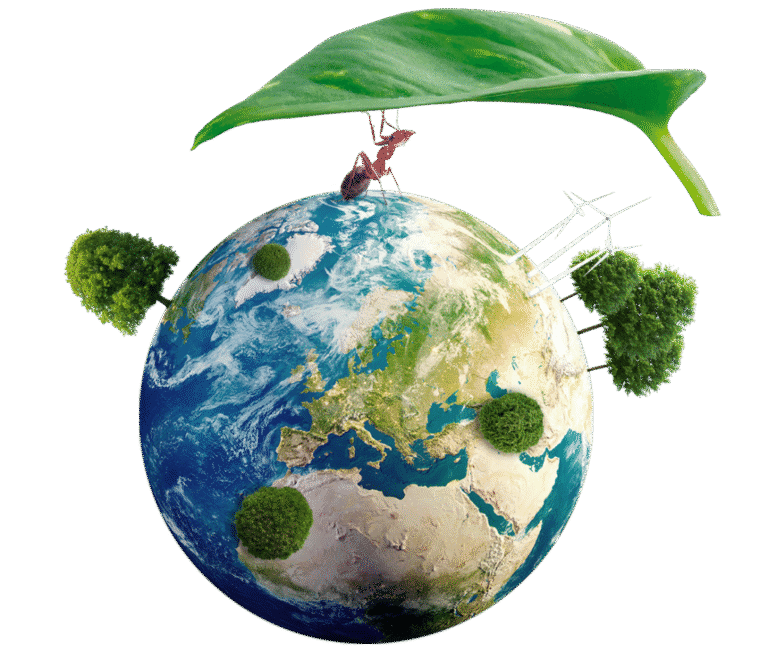
Барои одамон
Хатарҳои саломатии инсон аз хоҷагии фабрикӣ
Парвариши фабрикӣ хатари бузурги саломатӣ барои инсон аст ва он натиҷаи фаъолиятҳои бепарвоёна ва ифлос аст. Яке аз масъалаҳои ҷиддӣ истифодаи аз ҳад зиёди антибиотикҳо дар чорво мебошад, ки дар ин фабрикаҳо барои пешгирии бемориҳо дар шароити издиҳом ва стресс паҳн шудааст. Ин истифодаи пуршиддати он боиси пайдоиши бактерияҳое мегардад, ки ба антибиотикҳо муқовимат мекунанд ва сипас ба воситаи тамоси мустақим бо одамони сироятшуда, истеъмоли маҳсулоти сироятшуда ё манбаъҳои муҳити зист ба монанди об ва хок ба одамон интиқол меёбанд. Паҳншавии ин "супербугҳо" таҳдиди ҷиддӣ ба саломатии ҷаҳон аст, зеро он метавонад сироятҳоеро, ки дар гузашта ба осонӣ табобат мешуданд, ба доруҳо муқовимат кунад ё ҳатто табобатнашаванда гардонад. Илова бар ин, парвариши фабрикӣ инчунин муҳити мусоид барои пайдоиш ва паҳншавии патогенҳои зоонозӣ - бемориҳое, ки аз ҳайвонот ба одамон гирифта ва интиқол дода мешаванд, фароҳам меорад. Микробҳои ба монанди Salmonella, E. coli ва Campylobacter сокинони парваришҳои ифлоси фабрикӣ мебошанд, ки паҳншавии онҳо имкони мавҷудияти онҳоро дар гӯшт, тухм ва маҳсулоти ширӣ зиёд мекунад, ки боиси бемориҳои ғизоӣ ва хуруҷ мегардад. Ғайр аз хатарҳои микробӣ, маҳсулоти ҳайвоноти парвариши фабрикӣ аксар вақт аз чарбҳои сер ва холестирин бой мебошанд, ки боиси якчанд бемориҳои музмин, аз қабили фарбеҳӣ, бемориҳои дилу рагҳо ва диабети навъи 2 мегарданд. Ғайр аз ин, истифодаи аз ҳад зиёди гормонҳои афзоиш дар чорво нигарониҳо дар бораи ихтилоли гормонҳо ва инчунин таъсири дарозмуддати саломатии одамонеро, ки ин маҳсулотро истеъмол мекунанд, ба миён овардааст. Ифлосшавии муҳити зист, ки аз парвариши фабрикӣ ба вуҷуд омадааст, инчунин ба таври ғайримустақим ба саломатии ҷамоатҳои наздик таъсир мерасонад, зеро партовҳои ҳайвонот метавонанд ба оби нӯшокӣ бо нитратҳо ва бактерияҳои хатарнок ворид шуда, боиси мушкилоти меъдаю рӯда ва дигар мушкилоти саломатӣ гарданд. Пеш аз ин, ин хатарҳо зарурати тағйироти фаврии тарзи истеҳсоли ғизоро барои ҳимояи саломатии ҷамъиятӣ ва инчунин ташвиқи усулҳои бехатар ва устувори кишоварзӣ таъкид мекунанд.
Истисмори ҳайвонот як мушкилоти густурда аст, ки ҷомеаи моро дар тӯли садсолаҳо бадбахт кардааст. Аз истифодаи ҳайвонот барои ғизо, либос, фароғат,...
Дар солҳои охир ҷаҳон шоҳиди афзоиши бемориҳои зоонозӣ буд, ки хуруҷҳои монанди Эбола, SARS ва аксари онҳо...
Дар ҷомеаи имрӯза, афзоиши назаррас дар шумораи одамоне, ки ба парҳези растанӣ рӯ меоранд, ба амал омадааст. Новобаста аз...
Бо афзоиши огоҳӣ аз таъсири манфии одатҳои ҳаррӯзаи истеъмоли мо ба муҳити зист ва некӯаҳволии ҳайвонот, ахлоқ...
Дар ҷаҳони идоракунии вазн, ҷараёни доимии парҳезҳои нав, иловаҳои парҳезӣ ва реҷаҳои машқҳои ҷисмонӣ ваъдаи зуд...
Мо ҳамчун ҷомеа муддати дароз тавсия дода шудааст, ки барои нигоҳ доштани саломатии умумӣ парҳези мутавозин ва гуногун истеъмол намоем...
Барои ҳайвонҳо
Азобҳои ҳайвонот дар фермаҳои саноатӣ
Парвариши фабрикӣ ба бераҳмии тасаввурнопазир ба ҳайвонҳо асос ёфтааст, ки ин ҳайвонҳоро на чун мавҷудоти зинда, балки чун молу маҳсулот мебинад. Ҳайвонҳо дар ин системаҳо дар қафасҳои танг бо фазои хеле кам барои ҳаракат нигоҳ дошта мешаванд, камтар аз он барои рафторҳои табиии худ, монанди чорӣ, лонасозӣ ё иҷтимоӣ шудан. Шароити маҳдуд азобҳои шадиди ҷисмонӣ ва рӯҳӣ меорад, ки боиси ҷароҳатҳо ва стрессҳои музмин мегардад ва рафторҳои ғайримуқаррариро ба монанди хашмгинӣ ё худзарарӣ ба вуҷуд меорад. Давраи идоракунии такрории ғайричашмдошт барои ҳайвонҳои модар беохир аст ва фарзандон дар давоми соатҳои аввали таваллуд аз модар ҷудо мешаванд, ки боиси стрессҳои шадид дар ҳам модар ва ҳам фарзанд мегардад. Гӯсолаҳо аксар вақт ҷудо ва дур аз робитаҳои иҷтимоӣ ва пайванд бо модарашон парвариш меёбанд. Амалҳои дардовар ба монанди буридани дум, буридани чок, хунӣ кардан ва шохканӣ бе беҳушӣ ё дардшиканӣ иҷро мешаванд, ки боиси азобҳои нолозим мегардад. Интихоб барои ҳосилнокии максималӣ - оё суръати афзоиши тезтар дар мурғҳо ё ҳосили шир дар говҳои ширдеҳ - худи он боиси шароити вазнин ва дардноки саломатӣ гардидааст: мастит, нокомии узвҳо, деформатсияи устухон ва ғайра. Бисёр намудҳо тамоми умри худро дар муҳитҳои ифлос ва серодам, ки ба беморӣ майл доранд, бе нигоҳубини дурусти байторӣ аз сар мегузаронанд. Вақте ки онҳо аз нури офтоб, ҳавои тоза ва фазо маҳрум мешаванд, онҳо дар шароити фабрикӣ то рӯзи қатл азоб мекашанд. Ин бераҳмии доимӣ нигарониҳои ахлоқӣ ба миён меорад ва инчунин нишон медиҳад, ки то чӣ андоза амалиёти саноатии кишоварзӣ аз ӯҳдадориҳои ахлоқӣ барои муносибати нек ва бошарафона бо ҳайвонҳо дур аст.
Истисмори ҳайвонот як мушкилоти густурда аст, ки ҷомеаи моро дар тӯли садсолаҳо бадбахт кардааст. Аз истифодаи ҳайвонот барои ғизо, либос, фароғат,...
Бо афзоиши огоҳӣ аз таъсири манфии одатҳои ҳаррӯзаи истеъмоли мо ба муҳити зист ва некӯаҳволии ҳайвонот, ахлоқ...
Дар солҳои охир, истилоҳи "ҳамагирак" барои масхара ва кам кардани онҳое, ки тарафдори ҳуқуқи ҳайвонотанд, истифода мешавад...
Уқёнус беш аз 70% сатҳи Заминро фаро мегирад ва хонаи гуногунии ҳаёти обӣ аст. Дар...
Веганӣ танҳо интихоби парҳез нест - он ӯҳдадории амиқи ахлоқӣ ва маънавиро ба кам кардани зарар ва мусоидат кардан ба...
Кишоварзии фабрикӣ ба як амалияи паҳншуда табдил ёфтааст, ки тарзи муносибати одамон бо ҳайвонот ва муносибати мо бо онҳоро тағйир медиҳад...
Барои сайёра
Хатарҳои устуворӣ аз кишоварзии фабрикӣ барои сайёра
Парвариши фабрикӣ хатари азимиро ба сайёра ва муҳити зист эҷод мекунад ва ба бозигари асосӣ дар таназзули экология ва тағирёбии иқлим табдил меёбад. Дар байни оқибатҳои муҳити зисти таъсирбахши кишоварзии пуршиддат партовҳои гази гулхонаӣ мебошад. Парвариши чорво, махсусан говҳо, миқдори зиёди метанро истеҳсол мекунад - гази пурқуввати гулхонаӣ, ки гармиро дар атмосфера хеле самаранок нигоҳ медорад, дар муқоиса бо диоксиди карбон. Пас, ин як омили дигари асосиест, ки ба гармшавии глобалӣ мусоидат мекунад ва ба тағирёбии иқлим суръат мебахшад. Дар саросари ҷаҳон, тозакунии оммавии заминҳои ҷангал барои чарогоҳи чорво ё барои парвариши зироатҳои якхела ба монанди лӯбиёи соя ва ҷуворимакка барои хӯроки чорво ҷанбаи дигари пурқуввати парвариши фабрикиро дар боиси қиршавии ҷангалҳо нишон медиҳад. Илова ба коҳиши иқтидори сайёра барои азхудкунии диоксиди карбон, нобудшавии ҷангалҳо инчунин экосистемаҳоро вайрон мекунад ва гуногунии биологӣ таҳдид мекунад, бо нобуд кардани муҳити зист барои намудҳои бесобиқа. Илова бар ин, парвариши фабрикӣ захираҳои обро дур мекунад, зеро барои чорво, парвариши зироатҳои хӯрокворӣ ва партофтани партовҳо оби зиёд лозим аст. Риштани бефосилаи партовҳои ҳайвонот дар дарёҳо, кӯлҳо ва обҳои зеризаминӣ бо моддаҳои зараровар ба монанди нитратҳо, фосфатҳо ва организмҳои ҳаётан муҳим, боиси ифлосшавии об ва пайдоиши минтақаҳои мурда дар уқёнусҳо, ки ҳаёт дар он ҷо вуҷуд надорад, мегардад. Мушкилоти дигар таназзули хок аз сабаби кам шудани моддаҳои ғизоӣ, эрозия ва биёбоншавӣ аз ҳад зиёд истифода бурдани замин барои истеҳсоли хӯрокворӣ мебошад. Ғайр аз ин, истифодаи фаровони пеститсидҳо ва нуриҳо экосистемаҳои атрофро нобуд мекунад, ки ба гулҳо, ҳайвонот ва ҷамоатҳои инсон зарар мерасонад. Парвариши фабрикӣ на танҳо саломатии сайёраро зери хатар мегузорад, балки инчунин фишорро ба захираҳои табиӣ афзоиш медиҳад ва ба ин васила дар роҳи устувории муҳити зист монеъ мешавад. Барои ҳалли ин мушкилот, гузариш ба системаҳои устувори ғизо муҳим аст, ки масъалаҳои ахлоқиро барои некӯаҳволии инсон ва ҳайвонот ва муҳити зист дар бар мегирад.
Баланд шудани аҳолии ҷаҳон идома дорад, бинобар ин талабот ба ғизо низ афзоиш меёбад. Яке аз манбаъҳои асосии сафеда...
Бо афзоиши огоҳӣ аз таъсири манфии одатҳои ҳаррӯзаи истеъмоли мо ба муҳити зист ва некӯаҳволии ҳайвонот, ахлоқ...
Парвариши чорво қисми марказии тамаддуни инсонӣ дар тӯли ҳазорҳо сол будааст, ки манбаи муҳими ғизо медиҳад...
Мо ҳамчун ҷомеа муддати дароз тавсия дода шудааст, ки барои нигоҳ доштани саломатии умумӣ парҳези мутавозин ва гуногун истеъмол намоем...
Парвариши фабрикӣ, ки бо номи кишоварзии саноатӣ низ маъруф аст, дар бисёр кишварҳо усули бартаридоштаи истеҳсоли ғизо гардидааст...
Салом, дӯстдорони ҳайвонот ва дӯстдорони муҳити зист! Имрӯз, мо мехоҳем ба мавзӯе диққат диҳем, ки шояд...
Сاخтмони ояндаи ҳамдардӣ ва устувор
- Дар якдилӣ, биёед ояндаеро орзу кунем, ки дар он парвариши фабрикӣ, ки боиси азоб кашидани ҳайвонот шудааст, ба таърихе табдил меёбад, ки мо метавонем бо табассуме дар рӯи худ дар бораи он сӯҳбат кунем, ки ҳамон ҳайвонот аз азоби худ, ки қаблан рӯй дода буд, гиря мекунанд ва саломатии афрод ва сайёра аз ҷумлаи афзалиятҳои асосии ҳамаи мост. Парвариш яке аз роҳҳои асосии истеҳсоли ғизои мост дар ҷаҳон; аммо, ин система баъзе оқибатҳои бад ба бор меорад. Масалан, дарди ҳайвонот таҷриба мекунанд, ки танҳо таҳаммулнопазир аст. Онҳо дар фазои танг ва серодам зиндагӣ мекунанд, ки маънои онро дорад, ки онҳо наметавонанд рафтори табиии худро ифода кунанд ва бадтараш, онҳо ба азобҳои бешумор дучор мешаванд. Парвариши ҳайвонот на танҳо сабаби азоб кашидани ҳайвонот, балки муҳити зист ва саломатӣ низ ба миён меояд. Истифодаи аз ҳад зиёди антибиотикҳо дар чорво ба афзоиши бактерияҳои антибиотик тобовар мусоидат мекунад, ки барои саломатии инсон таҳдид эҷод мекунад. Ҳайвонот ба монанди говҳо низ манбаи ифлосшавии об аз ҳисоби партофтани моддаҳои зарароваранд. Аз тарафи дигар, ҷорӣ кардани хоҷагии ҳайвонот тавассути фаъолияти буридани ҷангалҳо ва тағирёбии иқлим тавассути партови оммавии газҳои гулхонаӣ масъалаи ҳукмрон аст.
- Имони мо дар ҷаҳонест, ки дар он ҳар як махлуқе, ки дар ин ҷост, бо эҳтиром ва шаъну шараф эҳтиром карда мешавад ва нури аввал ба он ҷое, ки мардамон мераванд, роҳнамоӣ мекунад. Тавассути воситаҳои ҳукумат, барномаҳои таълимӣ ва ҳамкориҳои стратегӣ, мо сабаби гуфтани ҳақиқатро дар бораи парвариши фабрикӣ, аз қабили муносибати хеле дардовар ва бераҳмона бо ҳайвонҳо ҳамчун ҳайвонҳое, ки ғулом шудаанд, ҳуқуқ надоранд ва то ба ҳалокат расидаанд, ба дӯш гирифтаем. Диққати асосии мо ин аст, ки ба мардум таълим диҳем, то онҳо тавонанд қарорҳои оқилона қабул кунанд ва воқеан тағироти воқеӣ ба вуҷуд оранд. Humane Foundation муассисаи ғайритиҷоратӣ мебошад, ки барои ҳалли мушкилоти зиёде, ки аз парвариши фабрикӣ, устуворӣ, некӯаҳволии ҳайвонҳо ва саломатии инсон ба вуҷуд меоянд, ҳалли худро пешниҳод мекунад, ки ба ин васила имкон медиҳад, ки рафтори одамонро бо арзишҳои маънавии онҳо мувофиқ созанд. Бо истеҳсол ва таблиғи ивазкунандаҳои растанӣ, таҳияи сиёсатҳои самараноки некӯаҳволии ҳайвонҳо ва таъсиси шабакаҳо бо ташкилотҳои ҳам мисли мо, мо бо садоқат кӯшиш мекунем, ки муҳити ҳамдардӣ ва устуворро эҷод кунем.
- Humane Foundation бо ҳадафи умумӣ муттаҳид шудааст - ҷаҳоне, ки дар он 0% сӯиистифода аз ҳайвоноти хоҷагии фабрикӣ вуҷуд дорад. Ин як истеъмолкунандаи нигарон, дӯстдори ҳайвонот, муҳقق ё сиёсатгузор бошад, ҳамгиронимиз дар ҳаракат барои тағйирот бошед. Мисли як даста, мо метавонем ҷаҳоне созем, ки дар он ҳайвонот бо нармӣ муносибат кунанд, саломатии мо афзалият дошта бошад ва муҳити зист барои наслҳои оянда бетағйир нигоҳ дошта шавад.
- Вебсайт роҳ ба дониши ҳақиқати воқеӣ дар бораи хоҷагии аслии фабрикӣ, ғизои инсонӣ тавассути баъзе вариантҳои дигар ва имкони шунидани охирин маъракаҳои мост. Мо ба шумо имконият медиҳем, ки ба таври гуногун иштирок кунед, аз ҷумла тақсим кардани хӯрокҳои растанӣ. Инчунин даъват ба амал сухан гуфтан ва нишон додани он аст, ки шумо дар бораи пешбурди сиёсатҳои хуб ва таълими ҳамсоягии маҳаллии худ дар бораи муҳимияти устуворӣ ғамхорӣ мекунед. Як амали хурде, ки нерӯи барқро ташвиқ мекунад, дигаронро водор мекунад, ки қисми раванде шаванд, ки ҷаҳонро ба марҳилаи муҳити зист ва ҳамдардии бештар меорад.
- Ин садоқату раҳбарии шумо ба ҳамдардӣ ва талоши шумо барои беҳтар кардани ҷаҳон бештар муҳим аст. Омор нишон медиҳад, ки мо дар марҳилае ҳастем, ки қудрати эҷоди ҷаҳони орзуи худро дорем, ҷаҳоне, ки дар он ҳайвонҳо бо ҳамдардӣ муносибат мекунанд, саломатии инсон дар беҳтарин ҳолат аст ва замин боз ҳам зинда аст. Барои даҳсолаҳои ояндаи ҳамдардӣ, адолат ва некӯкорӣ омода шавед.

Ҳалли масъала
Танҳо 1 роҳҳал аст...
Оқибати истифодаи ҳаётро дар Замин бас кунед.
Барои он ки Замин тавозуни табиии худро барқарор кунад ва аз зарари муҳити зист, ки тавассути хоҷагиҳои фабрикӣ расонида шудааст, барқарор шавад, мо бояд заминро ба табиат баргардонем ва истисмори ҳайвонот ва экосистемаҳоро қатъ кунем.
Адабиёт
[1] https://tg.wikipedia.org/wiki/Пойафзори_об#Пойафзори_об_маҳсулот_(бахши_кишоварзӣ)
Арзиши экологӣ барои шир
[7] https://www.feedbusinessmea.com/2024/12/03/global-feed-industry-to-utilize-1048m-tonnes-of-grains-in-2024-25-igc/
[9] https://www.who.int/news/item/07-11-2017-stop-using-antibiotics-in-healthy-animals-to-prevent-the-spread-of-antibiotic-resistance
[10] https://en.wikipedia.org/wiki/Fish_slaughter#Numbers
[3] https://www.weforum.org/stories/2019/12/agriculture-habitable-land/
n
[8] https://tg.wikipedia.org/wiki/Сояи_дарози_чорво#Ҳисобот
n
[10] https://tg.wikipedia.org/wiki/Куштори_моҳӣ#Рақамҳо
Ҳамаи чизро наҷот диҳед
[11] https://www.unep.org/news-and-stories/press-release/our-global-food-system-primary-driver-biodiversity-loss

